“Where Are All the Women? Untold Experiences from the Holocaust”
“Where Are All the Women? Untold Experiences from the Holocaust” Read More »
“Where Are All the Women? Untold Experiences from the Holocaust” Read More »
The Women’s and Gender Studies program hosted a screening of the documentary, Trials of Spring, Wed., March 1 in the Life Sciences building, followed by a short but engaging discussion with Dr. Genevieve Meyers, Political Science Department, and Dr. Reem Abou-Samra, Religious Studies Department.
The documentary focused on the lives of three Egyptian women who fought for freedom and justice in Egypt’s Arab Spring and shed light on the human rights abuses committed during that time. Dr. Abou-Samra emphasized that the women’s efforts highlighted in the film are part of a tradition of women’s movements in Egypt dating back to the 1860s. She pointed out that one major difference between past movements and the Arab Spring is the role that cyber activism played in organizing the protests 10 years ago, and that the internet continues to enable Egyptians to speak out against oppression in a culture of political silence. Dr. Meyers reminded attendees that except for in Tunisia, the anti-government protests of the early 2010s in the Arab World, have largely failed.
If you missed the screening but would still like to see Trials of Spring, you can stream it via the Library’s Kanopy database using your Detroit Mercy username and password. If you need help accessing it, contact a librarian.
Women’s History Month screening, discussion of Trials of Spring Read More »
On Friday, February 11, 2022, the University of Detroit Mercy Chemistry Club hosted their 5th annual Women in Science event through Zoom. Over 100 students and faculty took the time out of their evening to attend this thought-provoking event.
Three panelists presented in breakout rooms on different topics. Dr. Jacob Kagey, Associate Professor of Biology at the University of Detroit Mercy, talked about how more privileged members of the scientific community can and should support more marginalized members. He asked students to consider what they can do to support equity in science. Many students talked about allyship and ways they could help advance the goal of equal pay for scientific professionals of all genders.
Dr. Andrea N. Matti, a Senior Lecturer in the Chemistry Department at Wayne State University, discussed how many women in science have to balance work and family, as many people think it is the woman’s job to take care of the family. She provided statistics on how women often leave their jobs to help their families out. However, she herself is a working mom and talked about how the balance between work and family is not as bad as it seems. Many students, especially women, expressed their preference for working rather than spending most of their time taking care of a family. They feel the husband and wife should collaborate so that they both can work the jobs they want.
Finally, Dr. Angela Asirvatham, Associate Professor in the Biology Department at Misericordia University, talked about the diversity of students at private colleges. She explained how little diversity there is at Misericordia, where the majority of students are Caucasian. She asked students who attended the event why they were interested in the University of Detroit Mercy and what their university could do to attract more students from other races. Students talked about programs, scholarships, the small size, and other reasons they had decided to attend Detroit Mercy.
Overall, the event was very successful. Students in attendance enjoyed the different topics addressed and found them useful in preparing them for the future.
Women in Science Symposium Addresses Students’ Futures Read More »
Google “Why do men ask women to smile?” and you’ll return up to 949,000,000 results. In her book project, Smile for Your Lives, Women and Girls, Professor Emerita Dr. Elizabeth Hill attempts to explain why.
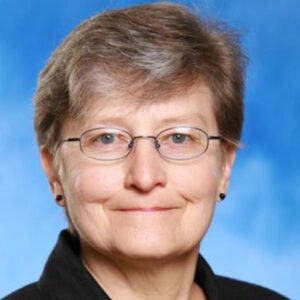
Guests at WGS’s 2021 virtual Feminist Scholarship Colloquium enjoyed a preview of Dr. Hill’s project, which was supported by a WGS Feminist Scholarship Grant. These annual WGS grants are awarded to full-time, part-time, and adjunct faculty members to support scholarly work that critically examine the place of women and/or gender in culture and society.
In her project Dr. Hill uses theories and research from the field of evolutionary psychology to shed light on some of the reasons why some oppressive gender-based patterns in relations between the sexes may be resistant to change despite legal and social progress in other areas.
In her Colloquium presentation “Why Expect Women to Smile? An Evolutionary Explanation” Dr. Hill focused on the widespread expectation that women smile as an expression of obedience and submission. As she pointed out, there are many types of smiles, and only some express happiness. Dr. Hill discussed the increasing prevalence in smiling in the U.S. society and the policing of powerful women’s facial expressions, such as the widespread attacks on Hillary Clinton’s “smirk” during her presidential campaigns. Dr. Hill also analyzed expressive patterns in primates for insights into how smiling became an expression to signal obedience to “dominant” individuals. Women’s smiling she explains, is often a response to fear of male anger; specifically, it can display subservience, a disposition to obedience. She argued that research from evolutionary psychology suggest that these expectations about obedient women stem from motivation to control women’s sexual behavior.
Dr. Hill’s talk intrigued audience members, and the subsequent discussion ranged from the #metoo movement, to the idea of “resting bitch face,” to how pandemic-related mask mandates might be impacting the ubiquitous expectation that women “smile, sweetheart.”
2021 Feminist Scholarship Colloquium Read More »
On Saturday, October 30, Heather Hill (Professor of English, WGS Affiliate Faculty) and Megan Novell (Interim Title IX Coordinator, Adjunct Professor of English, and WGS Affiliate Faculty) hosted a talk-back following a performance of Sophocles’ Antigone by the Detroit Mercy Theatre Company.
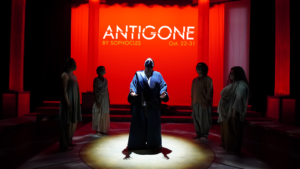
The talk-back centered on gender and power dynamics between the grieving Antigone and newly powerful Kreon. Hill and Novell led the audience through a comparison of the two characters, exploring how Antigone represents love of family and loyalty to higher law, whereas Kreon represents love of power and loyalty to the state. The conversation also covered how the prophet Tiresias has lived as both a man and a woman, and in this story is a pivotal source of wisdom and truth.
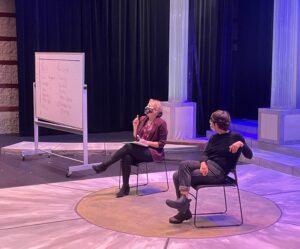 Approximately 30 audience members participated in the discussion, including students, faculty, and community members. This event was one installment of the Detroit Theatre Discussion Project, an initiative by the Department of Performing Arts that is being supported by the Michigan Council of Arts & Cultural Affairs.
Approximately 30 audience members participated in the discussion, including students, faculty, and community members. This event was one installment of the Detroit Theatre Discussion Project, an initiative by the Department of Performing Arts that is being supported by the Michigan Council of Arts & Cultural Affairs.
WGS faculty dive into the gender politics of “Antigone” Read More »

In advance of the November 2020 election, the WGS Program held a virtual educational event, Voting 101, on October 6, 2020. Over 35 students, staff, and faculty members were in attendance.
Two representatives from the non-partisan League of Women Voters, Detroit chapter President Rhonda Craig and voting rights activist Charles Thomas, Jr., presented information aimed particularly at first-time voters. Information included essential deadlines and locations for registering to vote and casting absentee ballots. Both speakers emphasized the importance of citizens exercising their right—or, as Thomas enthusiastically put it—power to vote.
The presenters also shared with attendees the League of Women Voters’ website, Vote411.org, which citizens can use as a one-stop shop for finding their poll locations and sample ballots. The site also provides information on candidates and ballot proposals.
Both the Political Science department and the Theta Tau chapter of Alpha Kappa Alpha sorority co-sponsored the event.
Voting 101 Event Prepped New Voters Read More »
On March 3, 2021, three members of the Women’s and Gender Studies Steering Committee gave a panel presentation via Zoom entitled “Women in Political Leadership: the First Female Vice President in the USA”. Led by Political Science Professor Genevieve Meyers and joined by Associate Librarian Kris McLonis and McNichols Library Head of Circulation/Adjunct Professor of English Megan Novell, the presentation focused not only on the election of Kamala Harris as Vice President in 2020 but also on the benefits of having women serving in government in general.
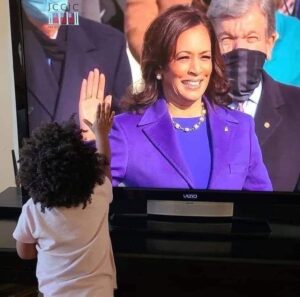
Meyers began by pointing out how long it took the United States to have a woman elected to the office of Vice President (after unsuccessful attempts by Geraldine Ferraro and Sarah Palin) and gave examples of other nations which had accomplished this as early as the 1930s. McLonis continued with an overview of the history of women serving in the United States Congress and the influence that their presence and service had on legislation. Novell discussed the role that women of color have played in artistic and political change in the United States since the nation’s inception.
Attendees of the presentation were invited to pose questions. Some of the topics addressed included the decades-long effort to ratify the Equal Rights Amendment and the question of whether to include women in the registration for selective service.
The presenters and attendees agreed that a yearly program addressing some aspect of women in politics would be a welcome feature. Keep your eye out for programming for March 2022!
Kamala Harris Joins the Long History of Women in Politics Read More »
In partnership with the Holocaust Memorial Center, the Women’s and Gender Studies Program at Detroit Mercy hosted an event on March 15 with hopes of educating the audience on the many heroines who, to save themselves and others, fought with defiance and dignity during the Holocaust. The discussion was led by Dr. Lori Weintrob, Professor of History and Director of the Wagner College Holocaust Center in Staten Island, New York.
Weintrob opened the discussion by proposing questions imploring the audience to identify the role of women and resistance in Holocaust education. Being informed about these Heroines, she said, will lead to “deepening our understanding of the Holocaust as whole.”
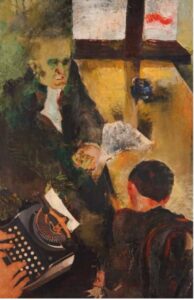
Focus remained on a few of the many significant women, whom Weintrob referred to as “Rescuers & Resisters.”
One woman, Friedl Dicker-Brandeis, used her talent as an artist to educate people on the tragedies of the Holocaust. Some of her most famous works include “This is How the World is, My Child” from 1933 and “Interrogation” from 1934, which she painted while in captivity for participation in the antifascist movement.
Before being captured and killed by the Gestapo in 1944, Marianne Cohn, another significant woman of the Holocaust, smuggled 200 children in small groups into Switzerland or French farmlands. EIF or French Jewish Scouts assisted in her efforts and altogether rescued over 1800 young adults and children. Cohn was described as never faltering or relenting even through all the interrogation by the Gestapo.
Cohn and another resister, Vitka Kempner, belonged to Zionist Youth Groups. Kempner’s group specifically turned into a resistance group known as the “Avengers.” Led by Abba Kovner, this group became one of the most successful and famous all-Jewish partisan units during the War. Kempner was responsible for one of the first resistance acts of the group, creating and smuggling a bomb out of the ghetto to blow up a Nazi train line.
Another Jewish partisan fighter, Sara Gianaite-Rubinson, served in the resistance as a part of the “Death to the Occupiers” unit. She would return to the ghetto to save individuals and smuggle them out. Later in life she served as a professor lecturing on World War II history and social science at York University.
Finally discussed were the efforts of Zivia Lubetkin, the commander of the Warsaw Ghetto Uprising of 1943 at just 28 years old. She served a critical role in the uprising as a movement leader and resister.
Weintrob concluded her presentation and discussion by offering that the integration of “Holocaust Heroines” into history education can help us to further understand how the Holocaust happened. The stories of these women in particular can lead to dialogue and reflection. Their leadership and skills, with attention to strategies for human rights, need to be acknowledged and represented in Holocaust education.
“With Pen and Pistol” Event Highlights Heroines of the Holocaust Read More »